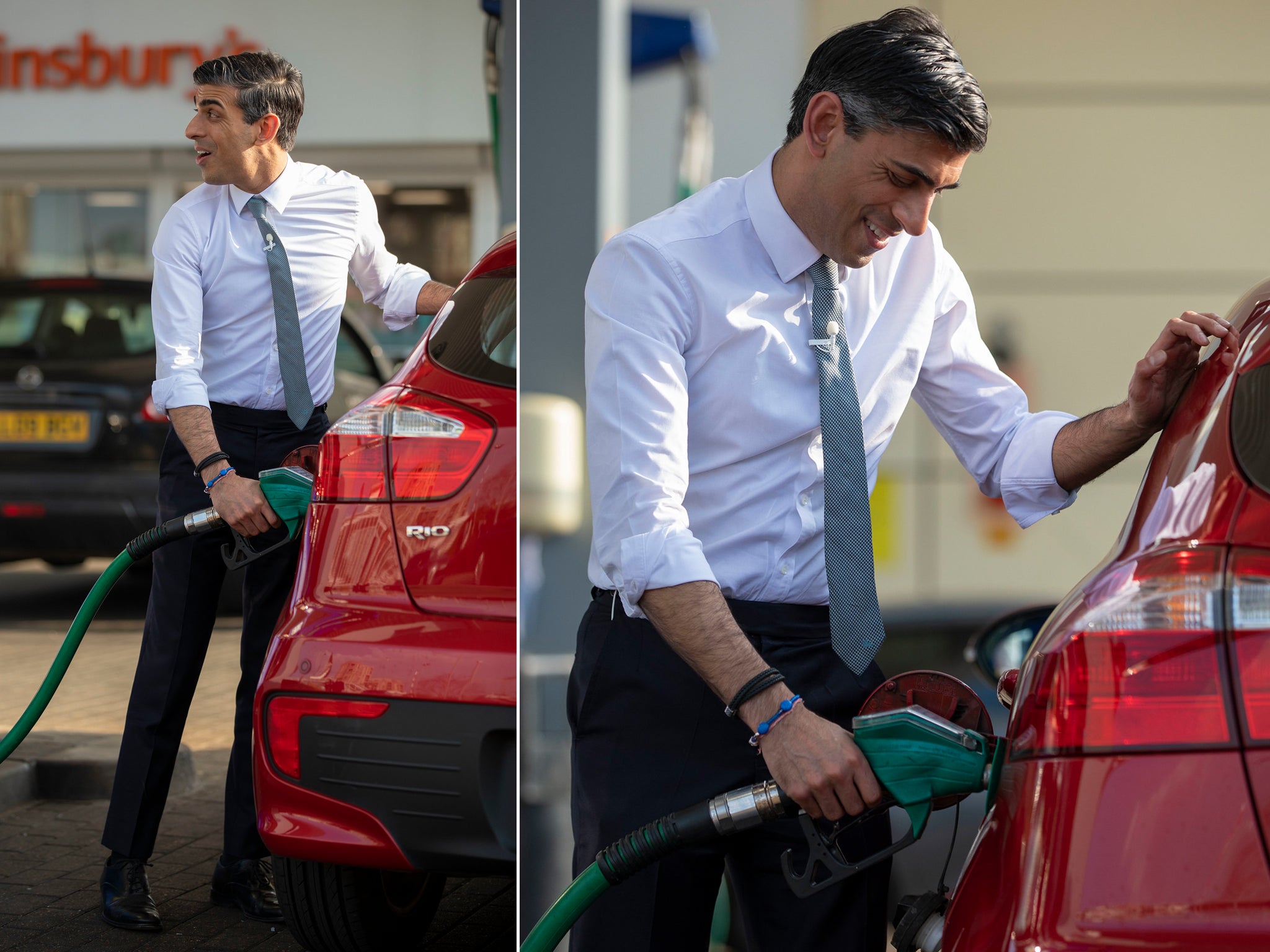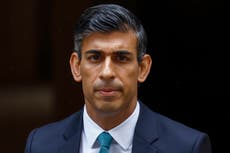Yes, the prime minister loves a helicopter ride – but for now, he is a driven man
Letting motorists into bus lanes, vetoing 20mph residential speed limits... with his regressive pro-car policies, Rishi Sunak is driving into a cul-de-sac, says Tom Peck


In his quiet moments, Rishi Sunak often thinks of the humble motor car and lets out a little smile. He has always loved the British motorist and the world they inhabit.
Often, on one of his many helicopter rides between Downing Street and his Yorkshire home, he will instruct his pilot to fly a little lower so that he might take in the full majesty of the Milton Keynes grid road system. He will watch the freely flowing traffic patiently gliding up and down between the roundabouts, not a traffic light to be seen.
Sometimes he’ll bank left, just for a glimpse at the Preston bypass, where the shoulders were once hardened with gravel, hence the name.
Earlier this summer, when he went by helicopter to Dover to make a speech about the boats he hasn’t stopped, he may or may not have glanced approvingly out of the window at the M20 motorway, which also doubles as an emergency Brexit car park. It is not known whether he noticed, directly below him, the oft-forgotten HS1 railway line, which could have taken him there in well under an hour at a cost to the taxpayer of zero pounds precisely.
Sometimes, it is speculated, he likes to look out and imagine that all the little people below him are his own miniature toytown. There they all are, going about their little lives, in their little cars, and he likes to think about what he might do to help them on their little way.
One thing he definitely doesn’t do is think of it all as his own little train set. No, no, no, no. That option is right out.
This weekend, the prime minister is off to Manchester, a city whose connection to HS2 he is just waiting for the right moment to scrap. One thing we now know he will be doing, presumably as some kind of cover for the rolling train farce, is announcing a whole load of new, very much pro-car policies.
One of them is to do as much as he can to overturn the 20mph residential speed limit recently introduced in large parts of Wales, and certainly make it much harder for local councils to do the same in England. On Thursday, somewhat hilariously, he told a Welsh journalist that the 20mph speed limit was not “true to British values”.
He will also, we learn, make it easier for cars to use bus lanes, which will be of almost negligible benefit to drivers but significant detriment to bus passengers, the sort of giant leap backwards that only the truly audacious or dim would ever attempt.
The politics of cars are fascinatingly dreary. The prime minister’s very clear strategy – and only faint hope – is to seek out as many “wedge” issues as he can find. By positioning himself as pro-driver, he calculates, he will force Labour onto what he hopes is the uncomfortable territory of defending expensive cycle lanes, low speed limits, clean-air zones and all the rest of it. There is, naturally, some mileage there, but it’s the opposite of leadership.
In his dozens of local radio interviews on Thursday, he continually insisted that HS2 didn’t matter; what matters, he said, are “potholes”, and other such things that affect people’s journeys “right now” – as if a brand new railway line that will more than double capacity, allowing for more frequent and more reliable commuter trains, didn’t matter, for no greater reason than that no one has used it yet.
In the build-up to what will almost certainly be his one and only party conference as prime minister, Sunak has made his strategy extremely clear. It’s to be firmly on the side of the reactionary, to be the poster boy for the millions of people who shake their heads and say no to change.
No to HS2, no to heat pumps, no to electric cars. No, in short, to the relatively small amount of political courage that would be required to move the country in the right direction.
One wonders whether the plan was hatched in consultation with his home secretary. She, as is well known, took a speed awareness course relatively recently. They have a new section now, in which attendees are shown the virtues of the 20mph speed limit. It is well known to be quite the eye-opener. It shows cars making their way around suburbia and getting to their destinations faster than they do at 30mph. Gaps are larger, there is scant delay in waiting to pull out. And also, almost no one dies.
Saying no to trains, no to bicycles, and no to all of the changes the country urgently needs is all very well, but he must know that it’s the politics of yesterday. And if he doesn’t know, yet, that so is he, then he will do soon enough.
Join our commenting forum
Join thought-provoking conversations, follow other Independent readers and see their replies
Comments


Bookmark popover
Removed from bookmarks